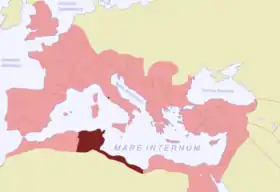Girus Tarasii
Girus Tarasii was a town in the Roman province of Numidia that became a residential episcopal see. It is tentatively identified with ruins situated at what is now called Henchir-Tarsa in Algeria.[1]

Girus Tarasii was probably the seat of an ancient bishopric which survives as a titular see of the Catholic Church,[1] by the name Tarasa in Numidia.
History
Bishopric
The city was the seat of an ancient bishopric.[2][3]
Little is known of the bishopric. However, the bishop here, Cresconio, attended the synod in Carthage in 484 called by the Vandal king Huneric after which the bishop was exiled.[4] The city may have been the home of Zosimus,[5] who participated in the Council of Carthage (256) called by Cyprian to discuss the problem of Lapsi, though more likely he was of Tarasa of Byzacena.[6]
- Zosimus? (fl 256)
- Cresconio (fl 484)
- Urbain Etienne Morlion (1939–1959)
- Antonino Pinel (1961–1987)
- Luis del Castillo Estrada (1988–1999)[7]
- Artur Grzegorz Mizinski, from 3 May 2004
The bishopric ceased to effectively function with the Muslim conquest of the Maghreb but was re-founded in name in the early 20th century and remains as a titular bishopric.[8] The current bishop is Artur Grzegorz Miziński of Poland.[9]
See also
References
- Annuario Pontificio 2013 (Libreria Editrice Vaticana 2013 ISBN 978-88-209-9070-1), p. 903
- Stefano Antonio Morcelli, Africa Christiana, Volume I (Brescia, 1816), p. 307.
- Pius Bonifacius Gams, Series Episcoporum Ecclesiae Catholicae (Leipzig 1931), p. 468.
- Morcelli
- H. Jaubert, "Évêchés Anciens et ruines chrétiennes de la Numidie et de la Sitifienne", in Reports of Notices et Memoires de la Société archéologique de Constantine, vol. 46, 1913, p. 79.
- J. Mesnage, L'Afrique chrétienne, (Paris 1912), p. 432.
- Old Faithful magazine November 26, 2015.
- Pius Bonifacius Gams, Series Episcoporum Ecclesiae Catholicae, (Leipzig, 1931), p. 468.
- Titular Episcopal See of Tarasa in Numidia, at GCatholic.org.
